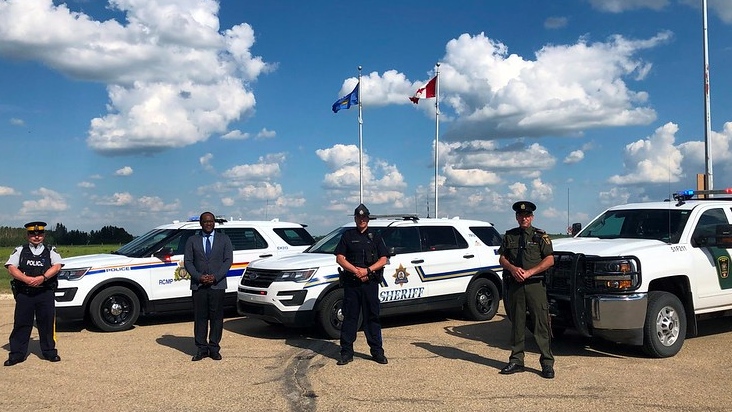Alberta Sheriffs receive expanded authorities to respond to traffic-related incidents
 Justice Minister Kaycee Madu stands with RCMP Const. Scott Hearn, sheriff highway patrol officer Mike Overly, and fish and wildlife officer Andy Nestorovich (Source: Ministry of Justice and Solicitor General)
Justice Minister Kaycee Madu stands with RCMP Const. Scott Hearn, sheriff highway patrol officer Mike Overly, and fish and wildlife officer Andy Nestorovich (Source: Ministry of Justice and Solicitor General)
Starting July 1, Alberta Sheriff highway patrol officers will have more authority to investigate traffic-related incidents to help reduce police response times in rural Alberta.
Under an expansion of the Rural Alberta Provincial Integrated Defence (RAPID) Response initiative announced Friday, approximately 260 sheriff officers will be able to respond to further traffic incidents on provincial highways, including impaired driving and criminal offences.
Before the RAPID response program expansion, traffic sheriffs were only able to enforce Traffic Safety Act violations, conduct commercial vehicle inspections, and participate in collision investigations.
For the provincial government, giving expanded authority to sheriffs allows for more RCMP officers to remain on patrol or respond to higher-priority criminal incidents.
“We are taking action to address the very real issue of crime in rural Alberta,” said Kaycee Madu, minister of justice, in a statement.
“We know Albertans have been frustrated with response times in rural areas, and we are committed to making sure they feel safe and protected in their communities,” Madu added. “More boots on the ground means authorities can respond more quickly when Albertans need them. It will also deter crime and make our highways and communities safer.”
The provincial government created the RAPID program to help reduce rural crime and decrease law enforcement response time to emergencies.
Many Indigenous leaders are opposed to the RAPID initiative over concerns it could create situations of over-policing or jurisdictional challenges.
According to the province, the government is holding consultation meetings with First Nations and Metis leaders to “determine their interest” and “earn their support” prior to expanding the RAPID initiative to their communities.
CTVNews.ca Top Stories

Can the Governor General do what Pierre Poilievre is asking? This expert says no
A historically difficult week for Prime Minister Justin Trudeau and his Liberal government ended with a renewed push from Conservative Leader Pierre Poilievre to topple this government – this time in the form a letter to the Governor General.
'I'm still thinking pinch me': lost puppy reunited with family after five years
After almost five years of searching and never giving up hope, the Tuffin family received the best Christmas gift they could have hoped for: being reunited with their long-lost puppy.
Wrongfully convicted N.B. man has mixed feelings since exoneration
Robert Mailman, 76, was exonerated on Jan. 4 of a 1983 murder for which he and his friend Walter Gillespie served lengthy prison terms.
Pickup truck driver killed by police after driving through Texas mall and injuring 5
A pickup truck driver fleeing police careened through the doors of a JCPenney store in Texas and continued through a busy mall, injuring five people before he was fatally shot by officers, authorities said.
Unifor members ratify new agreement with Canadian National Railway
Unifor said on Sunday that its members at Canadian National Railway (CN Rail) have ratified a new four-year collective agreement, averting a potential strike action.
6 adults, 4 children taken to hospital following suspected carbon monoxide exposure in Vanier
The Ottawa Paramedic Service says ten people were taken to hospital, one of them in life-threatening condition, following an incident of suspected carbon monoxide exposure Sunday morning in the neighbourhood of Vanier.
Two U.S. Navy pilots shot down over Red Sea in apparent 'friendly fire' incident, U.S. military says
Two U.S. Navy pilots were shot down Sunday over the Red Sea in an apparent 'friendly fire' incident, the U.S military said, marking the most serious incident to threaten troops in over a year of America targeting Yemen's Houthi rebels.
Big splash: Halifax mermaid waves goodbye after 16 years
Halifax's Raina the Mermaid is closing her business after 16 years in the Maritimes.
Second body recovered from site of B.C. landslide
The second resident of a home that was destroyed by a landslide in Lions Bay, B.C., last weekend was found dead Saturday, officials confirmed.






























